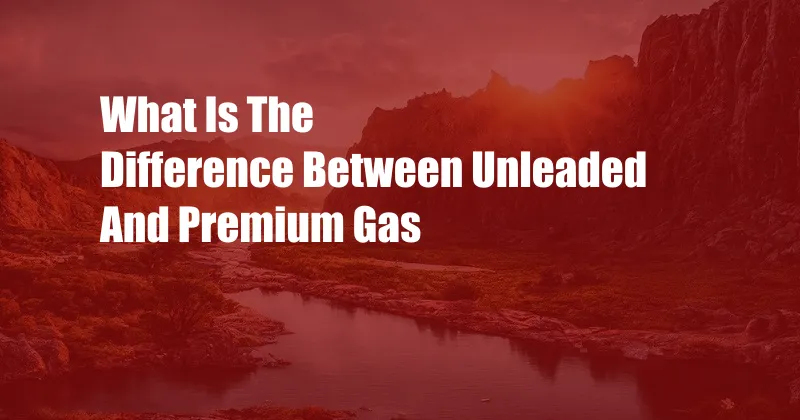
Unleaded vs. Premium Gas: Decoding the Fuel Differences
What’s in Your Tank?
As I pulled up to the gas station, a question crept into my mind: “Unleaded or premium?” It’s a common quandary that every driver faces, but do we truly understand the differences between the two? Unleaded and premium gas are more than just price points; they embody varying characteristics that can impact your vehicle’s performance.
Unleaded Gas: The Standard Choice
Unleaded gas, as its name suggests, contains no lead. This unleaded status stems from the 1970s when lead was widely used as an anti-knock agent in gasoline. However, due to its harmful environmental and health effects, lead was phased out of gasoline. Unleaded gas, which replaced leaded gas, remains the standard choice for most vehicles today.
Premium Gas: Unleashing Enhanced Performance
Premium gas, also known as high-octane gas, surpasses unleaded gas in its octane rating. Octane rating measures a fuel’s resistance to premature ignition. Higher octane gas can withstand higher compression ratios without knocking or pinging, which can occur when the fuel ignites too early. This difference in octane rating can make a notable difference in high-performance vehicles designed for premium gas.
Octane Ratings Explained
Octane ratings are represented by numbers, typically ranging from 85 to over 100. The higher the number, the greater the fuel’s ability to resist knocking. Unleaded gas typically has an octane rating between 85 and 89, while premium gas ranges from 91 to 93 or higher.
Benefits of Premium Gas
While unleaded gas is suitable for most vehicles, premium gas offers certain benefits for specific cars:
- Enhanced power and performance in high-compression engines
- Reduced knocking or pinging
- Improved acceleration and responsiveness
- Potentially cleaner engine components
Tips for Choosing the Right Gas
Selecting the right gas for your vehicle is crucial for optimal performance and longevity. Here are some expert tips to guide your decision:
- Consult your vehicle’s owner’s manual: The manufacturer’s recommendations will specify the required octane rating for your car.
- Pay attention to engine compression ratios: Higher compression ratios require higher octane gas.
- Consider vehicle performance: High-performance vehicles may benefit from premium gas for enhanced power and efficiency.
Frequently Asked Questions
Q: Can I use premium gas in my car that requires unleaded gas?
A: While it won’t cause any harm, premium gas in a vehicle designed for unleaded gas will not provide any performance benefits.
Q: Will premium gas improve my fuel economy?
A: Studies have shown mixed results. Premium gas may slightly improve fuel economy in some vehicles, while in others, it may have no effect or even reduce fuel economy.
Q: Is premium gas worth the extra cost?
A: For most vehicles, unleaded gas is the economical choice. If your vehicle requires premium gas, the cost may be justified for enhanced engine performance.
Conclusion
Unleaded and premium gas are distinct fuel options with unique characteristics. Unleaded gas is the standard choice for most vehicles, while premium gas offers enhanced performance benefits for high-compression engines. Understanding the differences between these fuels allows drivers to make informed decisions for their vehicles, ensuring optimal performance and fuel economy.
If you’re passionate about automotive topics, I’d love to hear your thoughts on unleaded vs. premium gas. Share your experiences and insights in the comments below.